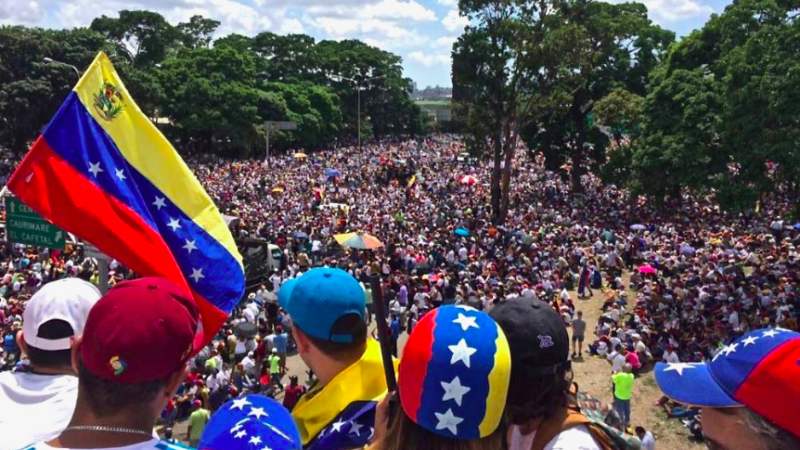With Donald Trump threatening a military intervention, there's never been a more critical time to campaign for a democratic way forward in Venezuela.

Following Donald Trump’s Venezuela comments over the weekend — he said he would not ‘rule out a military option’ — the crisis desperately requires a peaceful solution. Here’s how it could work.
There is currently deep political polarisation in Venezuela, primarily driven by a collapse in the economy, itself fuelled by the collapse in oil prices, and undoubtedly worsened by some sections of right-wing opposition seeking to use their economic power to sabotage the economy for political ends.
Serious analysts agree that both the Government and the right-wing opposition maintain the support of millions of Venezuelans, as recent elections and an opposition-called plebiscite showed — so a democratic solution is the only option.
When it comes to deciding how to move beyond the current political deadlock, Venezuela should tap into the knowledge and support of neighbouring countries in the region.
Talks between the opposing sides could come under the auspices of the Union of South American Nations (UNASUR) — such negotiations have taken place in the past with the participation of the former Presidents of numerous countries.
The Venezuelan government and much of civil society have indicated a willingness to take part in such talks.
Dialogue has to be based on all forces renouncing violence as a way to achieve political ends, and the rights of the Venezuelan people being guaranteed.
Violence to overturn constitutional mandates – including that of the democratically elected President – should be opposed by all democrats.
As Venezuela’s right-wing opposition becomes more emboldened through a series of recent attacks, we risk a return to the days of the 2002 coup attempt against Hugo Chavez and the campaigns in 2013 to 2014 to oust president Maduro.
In this context, a peaceful solution is the only option.
Those responsible for violence must be held to account, be it a police officer who killed a demonstrator, or right-wing opposition activists using mortars or lynching and burning people alive they suspect of being government supporters.
Rightly, arrests and prosecutions are taking place in Venezuela against security forces personnel who have committed human rights abuses.
Governments internationally, including Britain and the EU, should do all they can to facilitate and support such a dialogue process and help peacefully resolve the country’s difficulties, constructively engaging with Venezuela.
Instead of such an approach, the Trump administration is introducing unilateral US sanctions and threats of military force against Venezuela. These will not facilitate dialogue, but exacerbate the country’s difficulties and divisions.
In light of the US’s history of intervention in Latin America, including backing the 2002 military coup against Hugo Chavez, it is hardly surprising that polling suggests the majority of both opposition and government supporters in Venezuela oppose the US widening economic sanctions.
However, this is not the position of the whole international community. Proposals for the EU to follow Trump with its own sanctions have met with some scepticism.
President Macron of France has indicated his support for dialogue in Venezuela, and it has been reported that the governments of Portugal and Greece do not believe sanctions are the best way forward to help improve the situation.
Those who actually want to help Venezuela out of the current crisis – rather than simply using it as a stick with which to beat Jeremy Corbyn, as the right-wing press do – should put their efforts into supporting peace and dialogue.
Tony Burke is Assistant General Secretary of Unite the Union and Vice-Chair of the Venezuela Solidarity Campaign.
Left Foot Forward doesn't have the backing of big business or billionaires. We rely on the kind and generous support of ordinary people like you.
You can support hard-hitting journalism that holds the right to account, provides a forum for debate among progressives, and covers the stories the rest of the media ignore. Donate today.




2 Responses to “The solution in Venezuela must be peaceful – here’s how it could happen”
John
As if the USA have not got enough on their hands at the moment … .. . considering the state of the Venezuelan nation a forward thinking article Tony Burke.
Dave Roberts
The elections have been condemned by all South American countries except Cuba as far as I know.